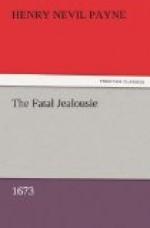Love and Honour are the two great Wheels, on which all business moves. The Tradesman cheats you upon his Honour, and like a Lord swears by that, but that he particularly loves you, you should not have it so. No Tragedy, Comedy, Farse, Demi-Farse, or Song nowadayes, but is full of Love and Honour: Your Coffee-drinking Crop-ear’d Little Banded-Secretary, that pretends not to know more of Honour than it’s Name, will out of abundance of Love be still sighing and groaning for the Honour of the Nation.
The speaker of the Epilogue to The Fatal Jealousy pointedly reminds the audience that they have listened to a genuine tragedy and not to an heroic play. Its author has not relied on the “rules of art,” but hopes he may have succeeded by some “Trick of Nature.”
Most obvious of the Shakespearean influences is the jealousy theme in which Don Antonio is modelled on Othello, Caelia on Desdemona, and Jasper on Iago. My colleague, Professor E.L. Hubler, who has a vast deal of the Shakespearean text in his memory, finds twenty-two possible echoes or parallels. Of these we agree that at least fourteen are certain. The influences strike in most impressively from Othello, Hamlet, Much Ado, Midsummer Night’s Dream, and The Tempest. Let me cite two or three unmistakable echoes. Jasper’s manner of arousing Antonio’s jealousy (pp. 17-19) and even his words recall Iago’s mental torturing of the Moor in Othello, III, 3. Throughout Gerardo’s soliloquy on death, at the opening of Act III, there is continuous reference to Hamlet’s “To be or not to be.” The antecedent of “madness methodiz’d” (p. 35) is easily spotted, as is the parallel between Flora’s dream (p. 63) which will not leave her head and the song that will not go from Desdemona’s mind. So far as I can discover, the seekers for Shakespearean allusions in seventeenth-century writing have not located this rich mine.
It is to be regretted that when The Fatal Jealousy came to the stage the company had, as Downes says, “plenty of new poets,” and so the play was laid aside after the first run. The performance must have been brilliant. The greatest of Restoration stage villains, Sandford, played Jasper. The parts of Caelia, Eugenia, and the Witch were taken by veteran actors. “Mr. Nath. Leigh” made his second appearance on the stage in this performance as Captain of the Watch. The lecherous Nurse to Caelia was played by the famous Nokes whose sobriquet of “Nurse Nokes” may have come to him with this role rather than from the part he took, seven years later, in Otway’s Caius Marius.
The text of The Fatal Jealousy presents no special difficulties. Such slight variations as I have found among the eleven copies I have examined—chiefly dropped letters and the imperfect impression of some words—can be accounted for as accidents to be expected in the printing off of the sheets of a single edition. There seems to be no significance in the fact that the title-page in some copies shows an ornament placed between the second rule and the word London.




